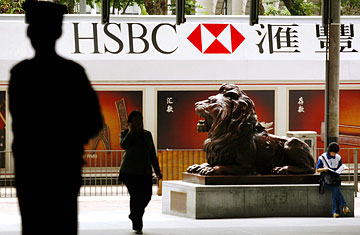
A security guard patrols the HSBC flagship office building in central Hong Kong on May 17, 2004
Megabank HSBC has been as much a part of Hong Kong history as Victoria Harbor, high tea at the Peninsula Hotel and martial-arts movies. Founded in 1865 as the Hongkong and Shanghai Banking Corporation, HSBC backed some of city's most important businessmen, including tycoon Li Ka-shing, and remains Hong Kong's No. 1 bank. But for much of the past 20 years, HSBC has expended a lot of its energy striving to be more than an Asian institution. With major acquisitions in the U.K., the U.S. and elsewhere, HSBC grew into one of the world's largest banks, with a truly international footprint. Since 1993, the Hong Kong stalwart has had its global headquarters in London.
But now HSBC has realized home is where the heart — and the money — is. On Sept. 25, HSBC announced that its chief executive, Michael Geoghegan, will relocate his office back to Hong Kong in February, 2010. The decision is yet another sign of the growing economic influence of Asia. Calling Asia the bank's "strategically most important region," HSBC said in a statement that Geoghegan's move "further positions the Group for the shift in the world's center of economic gravity from West to East."
In some ways, HSBC is simply reacting to global trends and economic realities. HSBC's announcement coincided with the G-20 summit in Pittsburgh, during which it was decided that the group, which includes developing giants like China and India, would replace the West-dominated G-8 as the top coordinating forum for the world economy. While the U.S. and U.K. struggle to recover from the worst recession since the 1930s, Asia's economies, led by a resurgent China, are emerging from the downturn much more quickly, presenting more enticing business opportunities for HSBC and other global banks. HSBC's decision is also another signal that London may be losing some of its luster as a global financial capital.
HSBC, though, is also responding to the realities of its balance sheet. Its forays West have proved to be, at best, a mixed success, especially its business in the U.S. HSBC dove into the U.S. subprime mortgage and consumer credit market, mainly through its 2003 purchase of consumer finance firm Household International. That decision proved disastrous. For the 18 months ending in June, HSBC's U.S. personal-financial-services business posted pretax losses of $20 billion. In March, HSBC announced its consumer-finance operation wouldn't issue any more loans and would begin winding down its business (except for credit cards). Chairman Stephen Green said in a statement at the time that the Household purchase was one "we wish we had not undertaken."
Meanwhile, HSBC's Asia businesses continue to thrive. In the first half of 2009, its regional operations notched a pretax profit of $4.5 billion, more than half of it coming from Hong Kong alone. The bank is also continuing to expand in Asia. In China, where HSBC already has the largest branch network of any foreign bank, it is considering an initial public offering of stock on the Shanghai exchange. In May, HSBC completed its acquisition of Bank Ekonomi in Indonesia, almost doubling its number of outlets in that country to 207.
HSBC isn't completely turning its back on the West. Green, the chairman, will remain in London, as will HSBC's official world headquarters. Yet HSBC's return to Asia is still an important signal of where the bank and the world economy believes it will find new growth. "The self-styled 'world's local bank' is realizing some locales are more important than others," noted an editorial in the South China Morning Post, Hong Kong's largest English-language newspaper. "It has taken an extraordinary financial crisis for the bank to see that its future lies where its roots are." In this supposedly borderless economy, perhaps it does matter where you sit.
